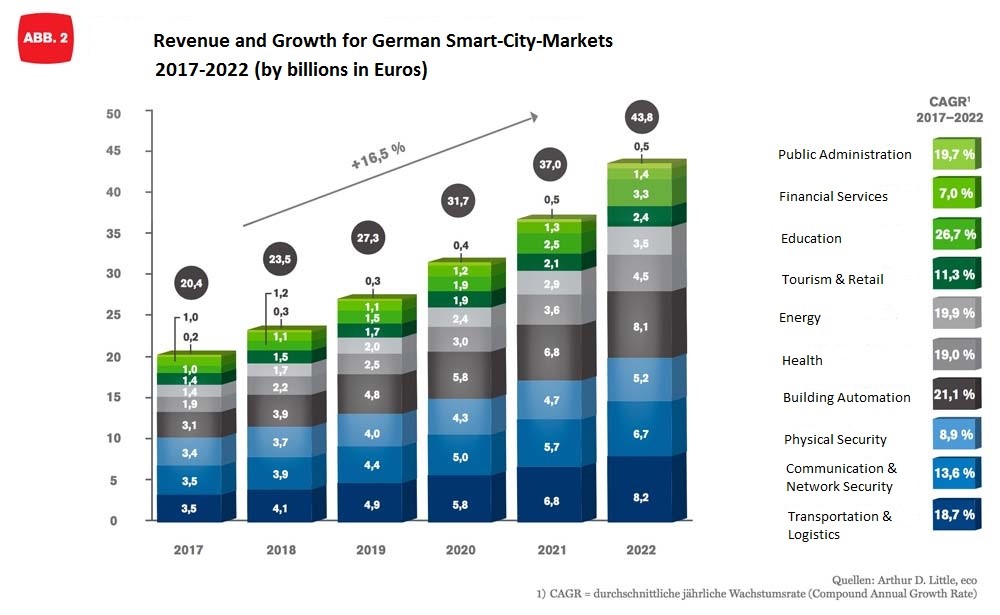Overview
The term “smart cities” refers to the development and use of ICT in almost all areas of local life in order to link municipal infrastructures such as energy, buildings, governance, transportation, water and sewage on the basis of integrated development concepts. Enabled by the Internet of Things (IoT), sensors, networks, and mobile-based technologies are the basis of any smart city concept.
With the 2020 Smart City Model Projects Program, where 32 selected projects (cities, inter-municipal consortiums, and counties) are
funded with around EUR 350 million, the German government is helping municipalities by funding the development of integrated smart city strategies and their implementation. The funding program focuses on cross-sectoral initiatives that can be adapted by other German municipalities.
With its coronavirus stimulus package, Germany is making an additional EUR 500 million available for smart city development. In total, Germany is investing EUR 1,250 billion to advance the development and implementation of urban technologies. More details from GTAI.
Cities in Germany and Europe have grown over centuries and digital technologies are now being added and complementing existing infrastructures can be quite a lengthy process. This is in sharp contrast to Asia, where cities are being built from scratch. Many German cities develop all of their smart city ideas under one roof. Hence, establishing a contact to municipalities is important.
With 77 percent of Germans living in cities and towns, the relevance of strategic urban development through digital solutions is widely recognized. The technology disrupting urban living today has the potential to improve quality of life. Innovative solutions and good decision-making are key to success.
Best Prospects for U.S. Exports
- Building and construction: Energy-efficient buildings and modernization, smart homes
- Energy: Expansion of renewable energy generation, smart grids and distribution, and energy storage systems
- Environmental technology: New solutions for waste recycling and waste-water treatment
- Management: Digital solutions/IoT for the municipal economy, security for critical infrastructure
- Transportation/Logistics: Investment in public transport and smart traffic systems, e-mobility, electric vehicle charging infrastructure, autonomous driving
- Ports: Fully automated port where all devices are connected via IoT
Challenges
Both the U.S. and Germany are leaders in innovation and early adopters of new technologies rapidly developing ideas into products. Being an innovative technology and solution provider in Germany usually means to compete and do business in a saturated market. It is not an easy undertaking to compete, stand out and even thrive in a saturated market. Having the right approach, careful analysis, and a relentless commitment to providing something unique and of value to customers, will eventually set up for medium and long-term success.
Selected Trade Events
Building and Construction: Bau Munich, messe-muenchen.de/en/technical/events/bau-2023.phpJanuary 09-14, 2023
ISH, Frankfurt, March 13-17, 2023
Chillventa, Nuremberg, October 11-13, 2022
Energy: E-world of energy and water, Essen, February 8-10, 2022
Energy Storage Europe, Dusseldorf, September 20-22, 2022
Hannover Messe, Hannover, April 25-29, 2022
Environmental technology: IFAT Munich, Munich, May 30-June 3, 2022
Management: Intergeo, Essen, October 18-20, 2022
Transportation/Logistics: IAA Munich, September 5-10, 2023
Innotrans, Berlin, September 20-23, 2022
PolisMOBILITY, Cologne, May 18-21, 2022
Ports: SMM Hamburg, Hamburg, September 6-9, 2022 (smart ports)
Resources
